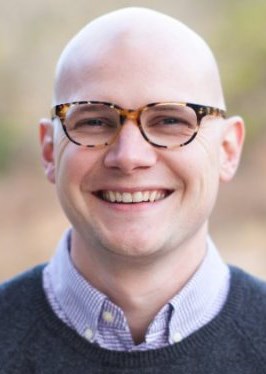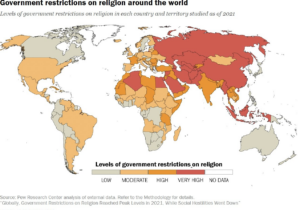Last month, the US Department of State hosted the first ever Ministerial to Advance Religious Freedom. The three-day conference was hosted by Secretary of State Mike Pompeo and Ambassador at Large for International Religious Freedom Sam Brownback, and the week was packed with a number of side events, including one hosted by the Ethics & Religious Liberty Commission (ERLC) on religious freedom in Southeast Asia. The purpose of the ministerial was to build on the leadership the United States exerted over the last 10 years, building international support for international religious freedom (IRF) advocacy at the United Nations and in other multilateral fora.
The event was well attended with nearly 90 countries represented, about half of which were represented at the foreign minister level.
Release of the Potomac Declaration
As a part of the ministerial, the US government released the Potomac Declaration, a comprehensive statement on the foundation and nature of religious freedom in the international context. The content of the statement expands upon Article 18 of the Universal Declaration of Human Rights and provides a useful reference point for the contours and practical elements of religious freedom.
The statement is worth reading in its entirety, but the opening paragraph of the preamble is particular noteworthy:
The Universal Declaration of Human Rights proclaims in Article 18 that “everyone has the right to freedom of thought, conscience and religion; this right includes freedom to change his religion or belief, and freedom, either alone or in community with others and in public or private, to manifest his religion or belief in teaching, practice, worship and observance.” The freedom to live out one’s faith is a God-given human right that belongs to everyone. The freedom to seek the divine and act accordingly—including the right of an individual to act consistently with his or her conscience—is at the heart of the human experience. Governments cannot justly take it away. Rather, every nation shares the solemn responsibility to defend and protect religious freedom.
The opening statement of the Potomac Declaration is not just an articulation of religious freedom—it is a robust and theologically rich declaration on the source of human rights and the God-determined parameters for human government. It was a welcome surprise to encounter the US government asserting these arguments.
Positive movement in Uzbekistan
One of the most interesting storylines of the ministerial was Uzbekistan’s invitation to the event. Uzbekistan is on the State Department’s list of Countries of Particular Concern (CPC), the US government’s list of the worst violators of religious freedom around the world. The other CPCs are Burma, China, Eritrea, Iran, North Korea, Saudi Arabia, Sudan, Tajikistan, and Turkmenistan. None of these countries received an invitation to the ministerial.
So why was Uzbekistan present? Uzbekistan’s poor record on religious liberty is rooted in its efforts to contain Islamic extremism. Policies that begin with an aim toward containing extremism often expand, and government officials use them to target other disfavored religious minorities. Repressive policies also lead to greater extremism, providing a narrative to leaders seeking to radicalize the population. Indeed, President of the Senate Sodiq Safoyev said at a press conference to announce these Uzbek reforms that “you cannot fight radical Islam only through repressive measures; you have to fight for hearts and minds.”
At the press conference, the Uzbek foreign minister, justice minister, and two top legislative officials laid out a number of reforms aimed at restoring religious freedom and other civil and political rights. Whether Uzbekistan can secure its removal from the CPC list will depend on its ability to actually implement these reforms, but its announcement was an important first step.
This positive development in Uzbekistan was possible in part because for nearly 20 years Chris Seiple and the Institute for Global Engagement (IGE) have been building relationships and trust with members of the Uzbek government. IGE was well positioned to assist diplomatic efforts led by the State Department. Seiple has been a part of the IRF advocacy community from the beginning, co-founding the IRF Roundtable, which has become the center of gravity for civil society working with Amb. Brownback.
The advocacy community is growing
Brownback has brought impressive energy to this issue of religious freedom within the State Department, and this energy has caused the advocacy community to grow.
There was a huge cast of characters present at the ministerial—it was standing room only from the start of the event, with a number of additional participants watching on simulcast. Many organizations who had not worked in the international religious freedom space were seeking ways to engage, given this administration’s focus on the theme as a part of its foreign policy.
There has been a multi-faith community of advocates working on IRF issues for nearly 15 years. It takes time to develop relationships, which lead to mutual respect, which lead to trust, leading ultimately to groups’ ability to rely on each other. The success of the ministerial was built on this strong foundation.
One of the challenges moving forward, however, is that there are new players that threaten this community of trust. Some of these figures and organizations assert or have asserted, for instance, that Islam is not a religion but a political ideology and therefore not eligible for the full protections of the First Amendment. Some of these figures have promoted conspiracy theories attacking Muslim members of the IRF community. Bracketing these claims’ absurdity for a moment, attacks against Muslim members of the community of IRF advocates are especially galling given the strong and consistent stands these Muslim leaders have taken against extremism and terrorism.
It’s taken 15 years to build this advocacy community, and its future depends on its members’ collective resolve to stand firm on its core commitment of robust religious freedom for members of all faiths or no faith at all. The IRF community also depends on leadership from the government to reject arguments about Islam that ultimately undermine religious freedom for everyone.
Looking ahead
One major surprise was Secretary Pompeo’s announcement that the ministerial will become an annual event, which will provide ongoing opportunities to continue to grow international consensus and networks for advocacy on religious freedom. The State Department has also expressed a desire to assist and foster regional conferences and regional religious freedom coalitions focused on the specific issues those regions face.
Last month was a significant step forward for international religious freedom advocacy, but much work remains to be done. I’m grateful for Brownback’s leadership and advocacy on this issue both internationally and within the State Department itself.
—
Travis Wussow is vice president for public policy and general counsel at the Ethics & Religious Liberty Commission of the Southern Baptist Convention (ERLC). Travis led the ERLC’s first international office located in the Middle East prior to joining the Washington, DC, office. He received a BBA in Finance from The University of Texas at Austin and a JD from The University of Texas School of Law.
Photo Credit: US Ambassador at large for International Religious Freedom Sam Brownback delivers closing remarks at the Ministerial to Advance Religious Freedom at the US Department of State in Washington, DC, on July 26, 2018. State Department photo.







 Sponsor a student for Christianity & National Security 2024
Sponsor a student for Christianity & National Security 2024